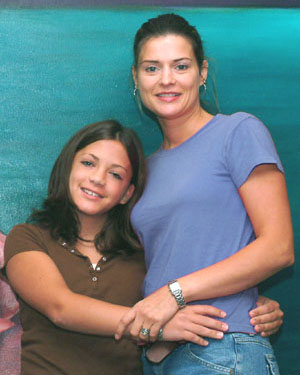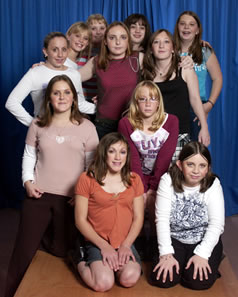Monosomy X (Turner Syndrome) (2n = 44, XO)
Monosomy
X (AKA Turner
Syndrome) is a karyotypic condition caused by
non-disjunction of X
chromosomes at Meiosis I
or II. It occurs in
about 1 / 2,000 live female births: a large proportion of
monosomic X fetuses
are aborted spontaneously in the first trimester. The second
X is completely
absent in about 50% of cases, partially deleted in about 30%, and instances of
tissue mosaicism (mixtures of XO and XX cells) are also
known.
The most obvious indications are very short stature (4'8" = 141 cm in untreated adults, correctable with hormone replacement), webbing at the neck (not always present, and correctable with cosmetic surgery), characteristic facial features (compare the girl & her mother in the first photo, but highly variable as seen in the remainder of the gallery), and a variety of secondary medical conditions. Girls with Turner Syndrome typically do not experience puberty without estrogen therapy: there is a trade-off between induction of sexual maturity so as to keep pace with the peer group, versus arrest of further height gain. Ovaries are typically undeveloped and ova rare, but some cases of successful reproduction are reported, apparently from mosaic individuals.
Contrary to popular belief and statements in some textbooks, the range of intellectual development is normal, though there seem to be difficulties with specific skill sets, particularly math. As with other genetic syndromes with stereotyped phenotypic presentations, the principal difficulty is acceptance by the peer group. Most women with Turner Syndrome lead typical lives, including normal family relationships. For further information, see [http://www.tss.org.uk] and [http://www.turner-syndrome-us.org].





The most obvious indications are very short stature (4'8" = 141 cm in untreated adults, correctable with hormone replacement), webbing at the neck (not always present, and correctable with cosmetic surgery), characteristic facial features (compare the girl & her mother in the first photo, but highly variable as seen in the remainder of the gallery), and a variety of secondary medical conditions. Girls with Turner Syndrome typically do not experience puberty without estrogen therapy: there is a trade-off between induction of sexual maturity so as to keep pace with the peer group, versus arrest of further height gain. Ovaries are typically undeveloped and ova rare, but some cases of successful reproduction are reported, apparently from mosaic individuals.
Contrary to popular belief and statements in some textbooks, the range of intellectual development is normal, though there seem to be difficulties with specific skill sets, particularly math. As with other genetic syndromes with stereotyped phenotypic presentations, the principal difficulty is acceptance by the peer group. Most women with Turner Syndrome lead typical lives, including normal family relationships. For further information, see [http://www.tss.org.uk] and [http://www.turner-syndrome-us.org].




